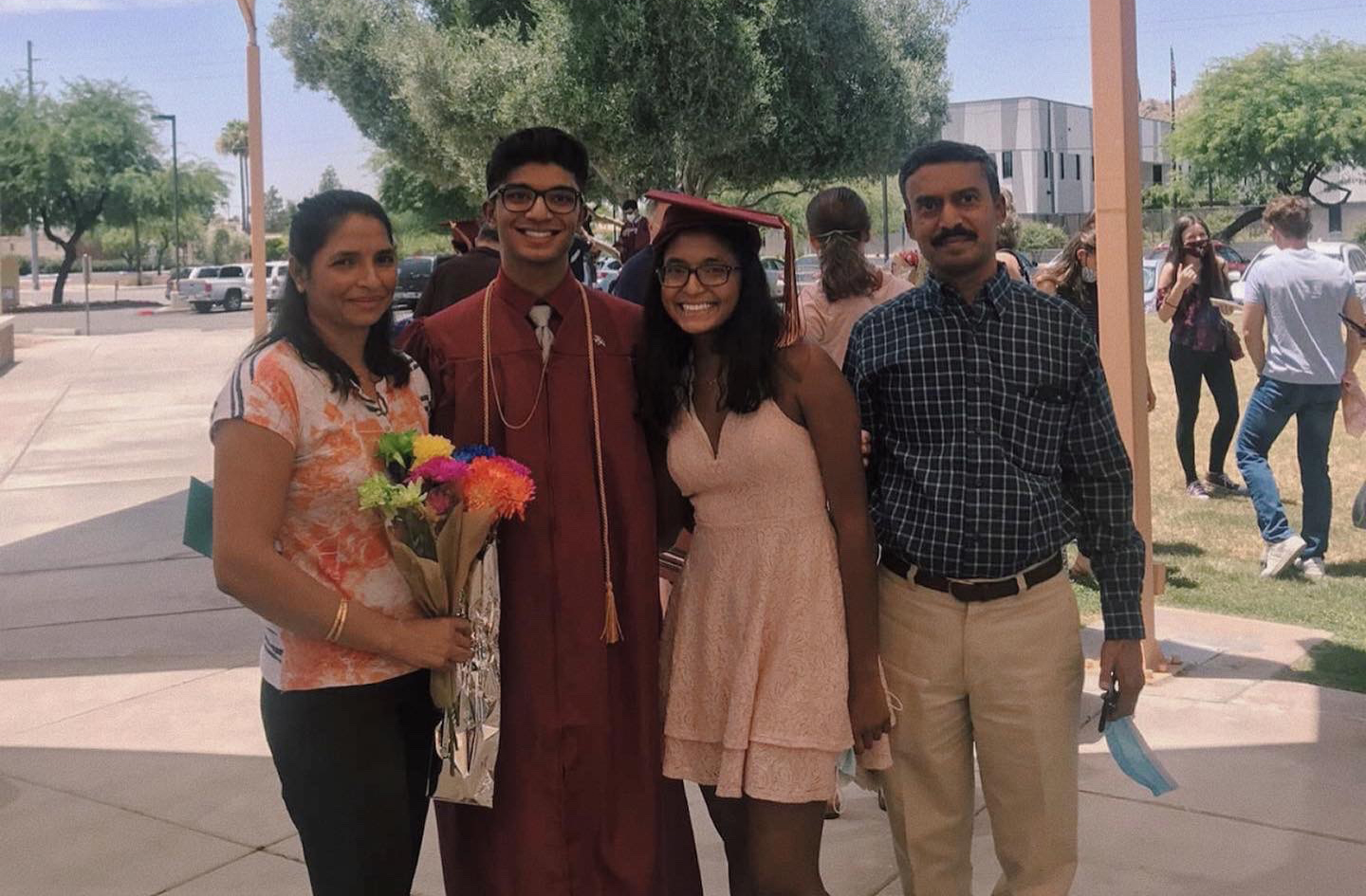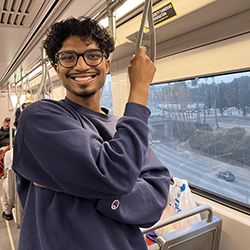
White Coat Profile: Brian Martins

The White Coat Ceremony marks the first time a medical student will don his or her white coat, the defining symbol of a physician. The coat bestows a great honor on each student, and with it comes a responsibility to uphold the trust of every patient they will encounter. The Class of 2029 will receive their white coats on July 18 during a ceremony that begins at 3:30 p.m. in Phoenix Symphony Hall.
Meet Brian Martins
Hailing from Phoenix, Arizona, Brian Martins graduated from Arizona State University (ASU) in December 2023, majoring in biomedical science and minoring in psychology. In his free time, he enjoys hiking and exploring the beautiful mountain ranges of Arizona.

His interest in medicine began when he participated in clinical volunteering while attending ASU. The ability to form meaningful connections with patients and bring healing through diagnosis and treatment inspired his interest in becoming a physician.
Martins credits his family as his greatest support system in his pursuit of achieving his dream of becoming a physician. His immediate family and extended family in rural Kinnigoli, South India, have provided him with consistent encouragement and relentless support.
“With the support of my family and friends, I am determined to become the first physician in my family and to provide compassionate, patient-centered care that addresses the unique health needs of communities across Arizona,” Martins said.
Path toward Medicine
What was the spark that led you to become a physician?
In my freshman year of college, I worked as a room service associate at Banner Thunderbird Medical Center throughout the COVID-19 pandemic. In this role, I was responsible for serving meals to patients throughout the hospital.
Since visitors were prohibited during this period of the pandemic, I was especially honored to serve as a companion to patients. As I delivered their meals, I would engage in deep and dynamic conversations, learning about these patients’ occupations, favorite travel memories, family stories and favorite TV shows.
As we shared laughter and personal struggles, I learned that genuine connection is the foundation of medicine. I was drawn to the idea of becoming a physician not only to provide care, but to be a trusted presence that shared in the care journey of patients.
At the same time, I was captivated by the illnesses that these patients were navigating from chronic kidney disease to atrial fibrillation. Seeing their physical symptoms sparked my curiosity about disease processes and how they impact the whole person.
As I began shadowing physicians and working in clinical environments, I was fascinated by the science behind the diagnosis and treatment, and how clinical knowledge could be used to restore healing and hope. The dual influences of personal connection and scientific inquiry sparked my interest in becoming a physician.
Did you do any volunteering in health fields prior to medical school?
In my freshman year of college, I served as a COVID-19 contact tracer at a time when Maricopa County reported some of the highest rates of COVID-19 transmission in the world. I connected those who tested positive with services to help quarantine, as well as traced their recent social interactions to minimize the spread of the virus. I listened closely to their fears and concerns, offering reassurance, resources and compassionate words to help ease their distress during that uncertain time.
Inspired by a loved one’s battle with childhood leukemia, I was motivated to lead initiatives to assist those struggling with cancer. Their laughter at the rhymes and imagery of children’s poems during treatment inspired me to write and publish my own poetry book, Hope in Verse: Poetic Journeys Through Cancer, written to bring comfort and empathy to others navigating cancer.

Wishing to extend this comfort in a more personal way, I volunteered to create poetry with cancer patients at Cancer Support Community – Arizona. In these poetry workshops, we wrote poems that gave voice to their experiences, struggles and emotions, offering them an outlet for self-expression and healing.
Additionally, I served as a research associate in the Cancer Evolution Center for four years as my team and I investigated cancer prevalence across animal species and their ancestors using evolutionary trends.
In our largest project, we investigated how certain traits, such as average adult weight or lifespan of the species, may predict tumor development and malignant cancer progression across 292 species. By analyzing these cancer trends, I learned to identify large-scale patterns and understood powerful parallels to human cancer progression.
The College of Medicine – Phoenix
Why did you choose the College of Medicine – Phoenix?
Throughout my time at ASU, I served as a Summer Scrubs counselor for two summers, and I also received mentorship through the Pre-Med Academy. In my time, the faculty were so supportive and encouraging, and the students were always uplifting and positive.
The University of Arizona College of Medicine – Phoenix became my first-choice school, and I chose it because it provides a collaborative environment to learn and offers amazing resources to succeed as a medical student. Ultimately, I knew I would be fully supported as a medical student at the U of A College of Medicine – Phoenix to chase my dream of becoming a physician!
What excites you most about beginning medical school?
I am most excited to meet my amazing classmates and cultivate meaningful, lasting friendships! I am excited to connect with people from Arizona, but also with others who travelled from around the country to come to the College of Medicine – Phoenix!
Also, I am excited to begin the Doctoring Program and learn the fundamentals of performing patient encounters and physical exams! The breadth and the depth of knowledge learned in medical school is a privilege, and I am eager to learn as much as possible to best serve my future patients!
Significance of the White Coat
What does the white coat mean to you?
The white coat symbolizes the beginning of a career dedicated to service and healing. It represents a dedication to use one’s clinical knowledge and abilities to protect the health and well-being of all people. The white coat means to me that I will do my best to serve others with compassion and integrity.
The white coat also represents the tremendous sacrifice and endless support of my family to enable me to pursue a career in medicine. I appreciate those that made it possible for me to don my white coat — my mentors, friends, families and the patients that have shaped my path with their stories and trust.
About the College
Founded in 2007, the University of Arizona College of Medicine – Phoenix inspires and trains exemplary physicians, scientists and leaders to advance its core missions in education, research, clinical care and service to communities across Arizona. The college’s strength lies in our collaborations and partnerships with clinical affiliates, community organizations and industry sponsors. With our primary affiliate, Banner Health, we are recognized as the premier academic medical center in Phoenix. As an anchor institution of the Phoenix Bioscience Core, the college is home to signature research programs in neurosciences, cardiopulmonary diseases, immunology, informatics and metabolism. These focus areas uniquely position us to drive biomedical research and bolster economic development in the region.
As an urban institution with strong roots in rural and tribal health, the college has graduated more than 1,000 physicians and matriculates 130 students each year. Greater than 60% of matriculating students are from Arizona and many continue training at our GME sponsored residency programs, ultimately pursuing local academic and community-based opportunities. While our traditional four-year program continues to thrive, we will launch our recently approved accelerated three-year medical student curriculum with exclusive focus on primary care. This program is designed to further enhance workforce retention needs across Arizona.
The college has embarked on our strategic plan for 2025 to 2030. Learn more.